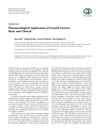 June 2023 in “Plastic and Reconstructive Surgery – Global Open”
June 2023 in “Plastic and Reconstructive Surgery – Global Open” Exosomes may improve skin, scars, hair growth, and fat grafts in plastic surgery, but more research is needed.
 2 citations,
January 2015 in “BioMed Research International”
2 citations,
January 2015 in “BioMed Research International” Growth factor treatments are increasingly used in medicine but require more research to fully understand their mechanisms.
 1 citations,
January 2005 in “Side effects of drugs annual”
1 citations,
January 2005 in “Side effects of drugs annual” The document concluded that various dermatological treatments have different effectiveness and side effects, with some causing irritation, allergic reactions, or systemic effects.
 3 citations,
January 2016 in “Biotechnology and Bioprocess Engineering”
3 citations,
January 2016 in “Biotechnology and Bioprocess Engineering” Laminaria japonica extract with IGF-1 improved mouse hair growth and could be a potential alopecia treatment.
 36 citations,
April 2016 in “Experimental Dermatology”
36 citations,
April 2016 in “Experimental Dermatology” Photobiomodulation may help with hair growth and wound healing, but research is inconsistent and needs better quality studies.
 44 citations,
April 2012 in “American Journal of Clinical Dermatology”
44 citations,
April 2012 in “American Journal of Clinical Dermatology” Scarring alopecias are complex hair loss disorders that require early treatment to prevent permanent hair loss.
 April 2024 in “Lasers in medical science”
April 2024 in “Lasers in medical science” Lasers and light therapies are effective in promoting hair regrowth for different types of hair loss.
 November 2023 in “JEADV Clinical Practice”
November 2023 in “JEADV Clinical Practice” Patients with severe alopecia areata felt better and less anxious or depressed when treated with baricitinib compared to placebo.
 1 citations,
March 2011 in “Journal of Investigative Dermatology”
1 citations,
March 2011 in “Journal of Investigative Dermatology” Blocking RANK signaling might help treat metastatic melanoma, but more research is needed.
 1 citations,
December 2021 in “Tropical Journal of Pharmaceutical Research”
1 citations,
December 2021 in “Tropical Journal of Pharmaceutical Research” Kanglaite injection with chemotherapy improves treatment and reduces side effects for advanced lung cancer.
5 citations,
March 2022 in “Frontiers in Medicine” PRP is effective for treating hair loss, especially with other treatments.
 16 citations,
October 2018 in “Biochemical and Biophysical Research Communications”
16 citations,
October 2018 in “Biochemical and Biophysical Research Communications” Sildenafil, often used for erectile dysfunction, may help hair growth.
October 2012 in “Faculty Opinions – Post-Publication Peer Review of the Biomedical Literature” Thymic peptides can either promote or inhibit human hair growth.
 June 2013 in “Faculty Opinions – Post-Publication Peer Review of the Biomedical Literature”
June 2013 in “Faculty Opinions – Post-Publication Peer Review of the Biomedical Literature” Wnt ligand secretion by hair follicle cells is essential for hair growth and repair.
 194 citations,
March 2003 in “American Journal of Pathology”
194 citations,
March 2003 in “American Journal of Pathology” Stress stops hair growth in mice by causing early hair growth phase end and harmful inflammation through a specific nerve-related pathway.
 26 citations,
October 2007 in “Experimental Dermatology”
26 citations,
October 2007 in “Experimental Dermatology” L-Carnitine-L-tartrate may help hair grow and prevent hair loss.
 4 citations,
March 1989 in “The BMJ”
4 citations,
March 1989 in “The BMJ” Naproxen is not the cause of hair loss in a child; it's due to a toxic event with expected hair regrowth.
 46 citations,
February 2012 in “Oncology Reports”
46 citations,
February 2012 in “Oncology Reports” Sorafenib helps some advanced cancers alone or with other treatments, but not all, and research continues to improve its use.
 December 2023 in “Annals of phytomedicine”
December 2023 in “Annals of phytomedicine” Dutasteride is more effective than finasteride for hair loss treatment.
1 citations,
January 2023 in “Skin Appendage Disorders” Radiofrequency devices can help remove or grow hair, but more research is needed.
 21 citations,
April 1998 in “Urology”
21 citations,
April 1998 in “Urology” Finasteride effectively treats BPH and hair loss but may cause sexual side effects.
 December 2024 in “Medicine”
December 2024 in “Medicine” Gut bacteria may affect hair loss risk.
 1 citations,
January 2017 in “Asian Journal of Chemistry”
1 citations,
January 2017 in “Asian Journal of Chemistry” New method effectively analyzes finasteride and its stability.
 December 2024 in “Health Science Reports”
December 2024 in “Health Science Reports” Topical metformin shows promise for dental and skin treatments, including periodontitis, hair regrowth, wound healing, and acne.
 1 citations,
October 2022 in “Molecular therapy”
1 citations,
October 2022 in “Molecular therapy” The FDA approved the first gene therapy for a blood disorder after overcoming early challenges and demonstrating patient benefits.
 November 2023 in “Translational Medicine Communications”
November 2023 in “Translational Medicine Communications” Derinat may improve hair growth and quality of life in hair loss patients by reducing oxidative stress.
 December 2024 in “Frontiers in Pediatrics”
December 2024 in “Frontiers in Pediatrics” Baricitinib improved platelet counts and alopecia in a 16-year-old with chronic immune thrombocytopenia.
 August 2019 in “Journal of The American Academy of Dermatology”
August 2019 in “Journal of The American Academy of Dermatology” 5% minoxidil foam effectively regrows hair in women, with postmenopausal women seeing the most improvement.

Higher levels of β-carotene and vitamin E may help prevent certain types of hair loss.
 81 citations,
July 2011 in “Lasers in Medical Science”
81 citations,
July 2011 in “Lasers in Medical Science” The Lexington LaserComb helped regrow hair in mice with a condition similar to human hair loss.



























